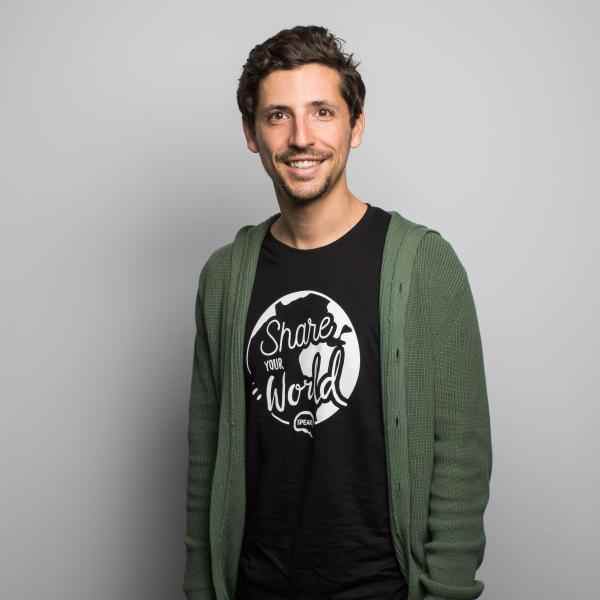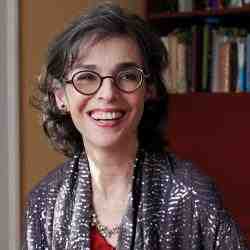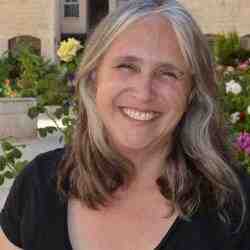Introdução
With SPEAK, Hugo fosters the organic emergence of local communities where migrants, refugees and locals meet and develop meaningful relationships as equals in a safe sharing space that values diversity, fosters deep human bonds and ultimately creates powerful informal support networks to enable the integration of newcomers.
A nova ideia
SPEAK promotes the organic emergence of communities where locals and migrants/refugees meet to share their culture and develop meaningful bonds by proving the platform and support for individuals to facilitate informal language learning environments and host community events.
From this simple service, newcomers have the opportunity to share their culture and values and develop meaningful relationships with locals as equals, rather than feeling as disempowered receivers as in other integration initiatives.
The fact that Hugo and his team withdraw themselves from the stage and present SPEAK as a language learning meetup and event launching platform, rather than an integration project, makes its users take ownership of the resulting culture/language sharing communities. By doing this, he is empowering newcomers to also be protagonists in the creation their informal support network and in their integration process at large.
SPEAK’s Online2Offline operating model allows for the automation of most operations regarding training, volunteers, allocation and follow up to language learning groups, event management or payments through a single online portal, while still providing network-building experiences offline to locals, migrants and refugees. This allows the project to scale and be replicated by a social franchising model.
O problema
There are 258 million international migrants globally. In European countries, almost half of non-EU citizens (48.6%) are at risk of social exclusion, resulting in difficulties finding a job and nurturing or participating in local communities as equals due to xenophobia, racism and ill-informed prejudices. Locals, from their side, feel unsafe with the entrance of “different” people in their country. Moreover the lack of opportunities to integrate, understand and empathize with people from other countries has exasperated tensions between migrants and local communities;.
Social integration solutions tend to place newcomers as weak support receivers, often locking them into a vicious circle of social support and assistance separate from locals and the bulk of society; for example public housing for immigrants is placed in one sector of the city, segregated from the general population.
This motivates locals to see migrants/refugees as a burden rather than a positive force to society. On the other hand, migrants/refugees, who are already vulnerable from having to leave their homes, lose further confidence in themselves and in their power to forge new lasting relationships in their new communities, curtailing them from feeling like they can make meaningful contributions to society.
As a consequence, migrants and refugees feel disconnected, don’t have friends or a solid support network and find it difficult access to local services for needs such as health, employment or justice. The situation is aggravated in the case of migrants and refugees in illegal situations, who are unable to even access the basic social and integration services.
A estratégia
SPEAK builds capacity for Buddies (facilitators/ informal teachers) and Ambassadors (community weavers) and provides them with frameworks, tools, infrastructure and materials so that they facilitate learning and sharing experiences within their community, being the main connection agents for people with different backgrounds.
For instance, if a Syrian woman registers in the online platform as a Buddy in Lisbon, she receives online training to understand the concept of SPEAK, learn about facilitation methods and share her experience and motivations with other facilitators. She is then automatically assigned by the platform to a group of participants who registered and are interested in learning Arabic. Together with a more experienced Buddy (e.g. a Lebanese man who has led SPEAK groups before), she facilitates that language/culture learning group once a week for periods of 3 months at a time. Materials and guidelines are provided by SPEAK in order to not only ensure the technical quality of the sessions, but to also ensure that she achieves the main goal of those sessions, which is to develop, in parallel to language learning, deep bonds and mutual support relationships among participants (this is done through games, sharing circles and other dynamics). In exchange, she may participate in other language/culture learning groups for free and takes the opportunity to learn Portuguese and English during the remaining days of the week.
On the other hand, if an Italian young man registers as an Ambassador in Berlin, he also receives online training and materials to better understand SPEAK’s values and spirit and to learn best practices in fostering the link between SPEAK’s Berlin team, Buddies and participants to help growing SPEAK’s local community. He commits to host culture sharing free events (e.g. international gastronomy dinners, cooking classes, dance workshops, etc.) in his neighbourhood once a month for SPEAK participants. For this, he uses the platform to find a space among those offered by SPEAK’s friends and partners, and to manage all organization of the event in terms of registration and communication. In exchange for his service, he may also participate in language/culture learning groups for free, and he takes the opportunity to learn German and Arabic.
The third option is to register as a participant. In this case, there is a small fee to be paid for attendance in the language/culture sharing groups. Those who cannot afford to pay this fee and cannot volunteer as a Buddy or Ambassador are granted a scholarship and participate for free (this currently happens for 20% of the participants).
In the last 4 years, the SPEAK community has grown to 13.9k members SPEAK across 10 different cities, in 4 European countries (Portugal, Spain, Germany and Italy).
Up to date, over 5,700 people have participated in SPEAK events and more than 6,100 people have attended language sharing groups, of which nearly 50% were foreigners. This network has created opportunities to incomers for getting informal recommendations and guidance regarding specific needs and integration challenges (e.g. how to access health system, how to express health concerns to a doctor, how to get subsidized housing, etc). It has also fostered new friendships and meaningful bonds among locals and newcomers, creating a sense of togetherness and belonging; the latest impact assessment report shows that, by the end of 12th week of participation in SPEAK’s learning groups and events, the participants’ sense of belonging in the host community has already increased by 15% and that language is 30% less of a barrier in their integration process. Moreover, Buddies and Ambassadors report that relationships formed by participants in their groups/events remain after SPEAK’s courses.
SPEAK communities have also became an example of the richness of diversity and the value brought by foreigners to host countries. By having migrants and refugees working as Buddies and Ambassadors, this project is giving them an opportunity to show the multiple faces of their culture. In the above mentioned impact assessment, participants reported feeling their culture is 40% more valued in their new host country.
Hugo’s team is continuously improving SPEAK’s experience and effectiveness. They do this in a participatory way, by engaging Buddies and Ambassadors to share their insights and improve teaching materials and methodologies. They are also currently developing an impact measurement process that will automatically engage new participants to provide pre and post-intervention data, in order to have a better understanding on how SPEAK is helping them to having more access to employment opportunities and social services such as health care or justice. With this, Hugo intends to improve and maximize SPEAK’s impact.
By 2021, Hugo expects to support over 20,000 migrants, refugees and locals across 40 European cities on an yearly basis. Moreover, he intends to do so by opening SPEAK’s chapters through a the Take Speak to Your City program, which enables the creation of social enterprises by local changemakers who are given a ready-to-use framework (training, methodologies, pedagogic materials and coordination tools) to ensure SPEAK can be successfully applied in their city. One recent chapter under this program (in the Portuguese city of Braga) was opened by a Syrian refugee who was a former SPEAK Buddy. In her case, Hugo got a grant from Google to match the needed upfront investment. Normally, the initiators of new chapters must do this investment themselves.
Also, the Portuguese Government recognized SPEAK as a best practice and has included it in the national strategy for integration of refugees and migrants, in collaboration with local institutions. Via this service, SPEAK language exchange model has the potential to operate all over Portugal and Hugo sees this happening in other countries as well.
A pessoa
Hugo Menino Aguiar was born into a migrant family. SPEAK’s origins go back to when Hugo found out that his great grandmother was expelled from her village due to her religious beliefs, and that his grandfather went clandestinely to France with the hope of providing better conditions for his family. As a result, Hugo is the son of a Zimbabwean father and a Portuguese mother who grew up in France. Fortunately, life joined these two migrants in a language exam, when they had both returned to Portugal.
Because of his family’s drive to pursue a better life, Hugo always had a sharp entrepreneurial sense. At the age of 7, Huge started his first business washing bicycles at a street corner with a friend. He got involved in volunteering when he was 14 years old, wishing to contribute to society, working with several local and national initiatives for Environmental, Animal and Human Rights Protection. Throughout his teens, he has never stopped having his own projects and side jobs.
In 2008, while seeking a Computer Science Engineering degree at the Universidade Nova de Lisboa (where he also worked as an Assistant Professor), Hugo founded Associação Fazer Avançar (“Moving Forward”), a non-profit that educates, trains and mobilizes youth to be agents of social change. This NGO was the result of Hugo’s business experience, and its mission was to fill the gap that he had felt when trying to set up one of his more complex business ventures without sufficient support and knowledge, in a society that often disbeliefs youth and mocks dreamers.
After leaving University, he worked in R&D and Marketing at OutSystems. During that period, he took a Business degree in West London College and received scholarships for academic programmes in Poland and Russia. Even though he had no financial hardship due to the scholarships and was involved with several student networks, he struggled to make new friends as he felt tough language and cultural barriers. Often he asked himself: “if this is that hard for me, how must it be for someone that crosses borders with nothing on the pockets to flee from war or persecution?” With this question in mind, Hugo came back to Portugal and kickstarted the Leiria Language Exchange (in 2012), which would later give place to SPEAK (in 2014).
In 2012, Hugo joined the Social Entrepreneurship Institute Bootcamp while simultaneously working for Google as a Scalable Support Strategist and Community Specialist. He was promoted to the role of Product Manager and split most of his time between Ireland and the state of California in the USA, while continuing to work on the soon-to-be SPEAK outside of business hours.
Once again facing the challenges of being a migrant in a new city, Hugo noticed first-hand how social inclusion projects try but struggle with the creation of meaningful long-term connections among participants, at both migrant-to-migrant and migrant-to-local levels. Following this experience, in March 2014, he left Google to build SPEAK.
In 2015, Hugo was recognized as one of the Top 20 young social entrepreneurs in the Euro-Mediterranean region by the United Nations Alliance of Civilizations, and in 2016 as a Global Shaper by the World Economic Forum.



